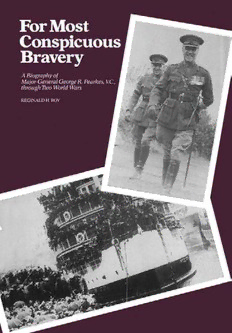
For Most Conspicuous Bravery: A Biography of Major-General R. Pearkes VC, through Two World Wars PDF
419 Pages·1977·23.416 MB·English
Most books are stored in the elastic cloud where traffic is expensive. For this reason, we have a limit on daily download.
Preview For Most Conspicuous Bravery: A Biography of Major-General R. Pearkes VC, through Two World Wars
Description:
I would have followed him through Hell,” said one of the men who was serving with George Pearkes at Passchendaele where he won the Victoria Cross. If his men were devoted to him, he was equally so to them. In the character of this distinguished Canadian soldier and statesman “most conspicuous bravery,” “utmost gallantry,” and “supreme contempt of danger” were combined with a deep sense of duty and a zeal for service. Set against the background of Canada’s twentieth century transformation from a rural and agricultural society into an urban technological nation, General Pearkes’s career makes a compelling biographical study. After proving up his homestead in Alberta, Pearkes joined the Royal North West Mounted Police and served in the Yukon until he was able to purchase his discharge and enlist in 1915. In Europe he was soon in the trenches, where, wounded five times, he saw the Canadian Army engage in battle after battle on the Western Front and win a reputation as an elite corps. In the two decades between the World Wars Pearkes served in the small permanent force as district commander, deputy commandant at the Royal Military College, Kingston, and as Director of Military Training in Ottawa. Neglect and apathy in the 1920’s and financial stringencies and isolationism in the 1930’s made the task of maintaining the militia in a state of preparedness increasingly difficult. When the inevitable war broke out in September 1939, Pearkes was among those who had to forge the weapon. Until late in 1942, when he was recalled to Canada to take charge of the Pacific Command, Pearkes served overseas training the 2nd Brigade and later the 1st Division as the Battle of Britain was waged overhead and plans and techniques for the eventual invasion of Europe were perfected. Back in Canada he became involved in the major political furore caused by the continuing need for reinforcements. Pearkes’s role in the conscription crisis and the “Generals’ Revolt” sheds new light on these important issues. Shortly before the war ended, Pearkes retired, but he soon accepted the call to stand as a member of Parliament. From 1945 to 1960, when he was appointed lieutenant-governor of British Columbia, he served as a Conservative defence critic and as Minister of Defence in the Diefenbaker cabinet. He was deeply involved in the highly charged and hotly debated decisions of the cold war era, including Bomarc, the Arrow, NATO, NORAD, and provisions for civil defence, and his views on them will be significant to those interested in Canadian political and military history.
See more
The list of books you might like
Most books are stored in the elastic cloud where traffic is expensive. For this reason, we have a limit on daily download.
